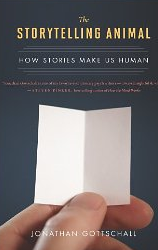I recently read “The Storytelling Animal: How Stories Make Us Human” by Jonathan Gottschall. Below are the quotes I found most interesting. As always, if you like the quotes, please buy the book here.
 “In one study, they found that heavy fiction readers had better social skills – as measured by tests of social and empathic ability – than those who mainly read nonfiction.” (66)
“In one study, they found that heavy fiction readers had better social skills – as measured by tests of social and empathic ability – than those who mainly read nonfiction.” (66)
“Fiction is a powerful and ancient virtual reality technology that simulates the big dilemmas of human life.” (67)
“The left brain is a relentless explainer, and it would rather fabricate a story than leave something unexplained.” (99)
“In short, the storytelling mind is a factory that churns out true stories when it can, but will manufacture lies when it can’t.” (103)
“The world’s priests and shamans knew what psychology would later confirm: if you want a message to burrow into a human mind, work it into a story.” (118)
“Throughout most of our history, we’re taught myths. The myths tell us that not only are we the good guys, but we are the smartest, boldest, best guys that ever were.” (125)
“We won’t go along [with a story] if someone tries to tell us that bad is good, and good is bad.” (129)
“Storytellers never ask us to approve. Morally repellent acts are a great staple of fiction, but so is the storyteller’s condemnation.” (130)
“It’s worth remembering that until recently, storytellers who attacked group values faced real risks. For tens of thousands of years before the invention of the book, story was an exclusively oral medium.” (133)
“In Appel’s study, people who mainly watched drama and comedy on TV – as opposed to heavy viewers of news programs and documentaries – had substantially stronger “just-world” beliefs.” (136)
“Appel concludes that fiction, by constantly marinating our brains in the theme of poetic justice, may be partly responsible for the overly optimistic sense that the world is, on the whole, a just place. And yet the fact that we take this lesson to heart may be an important part of what makes human societies work.” (136)
“IF the movie is good, the people will respond to it like a single organism. They will flinch together, gasp together, roar with laughter together, choke up together. A film takes a motley association of strangers and syncs them up. It choreographs how they feel and what they think, how fast their hearts beat, how hard they breathe, and how much they perspire. A film melds minds. It imposes emotional and psychic unity. Until the light come up and the credits roll, a film makes people one.” (136)
“Until the past few centuries, story was always an intensely communal activity.” (136)
“Tolstoy believed that an artist’s job is to “infect” his audience with his own ideas and emotions – “the stronger the infection, the better is the art as art.” (149)
“In fact, fiction seems to be more effective at changing beliefs than nonfiction, which is designed to persuade through argument and evidence.” (150)
“We are critical and skeptical. But when we are absorbed in a story, we drop our intellectual guard.” (152)
“Researchers found that memory was much less trustworthy than anyone had previously suspected.” (167)
“The past, like the future, does not really exist. They are both fantasies created in our minds. The future is a probabilistic simulation we run in our heads in order to help shape the world we want to live in. The past, unlike the future, has actually happened. But the past, as represented in our minds, is a mental simulation, too. Our memories are not precise records of what actually happened. They are reconstructions of what happened, and many of the details – small and large – are unreliable.” (169)
“We misremember the past in a way that allows us to maintain protagonist status in the stories of our own lives.” (170)
“William Hirstein writes, ‘The truth is depressing. We are going to die, most likely after illness; all our friends will likewise die; we are tiny insignificant dots on a tiny planet. Perhaps with the advent of broad intelligence and foresight comes the need for… self-deception to keep depression and its consequent lethargy at bay.” (175)
“Novelists who target highbrow readers shouldn’t complain when those are the only readers they get.” (179)
Liked the quotes? Buy the book here.

